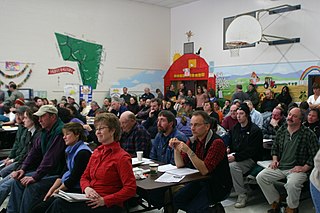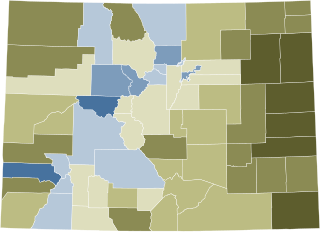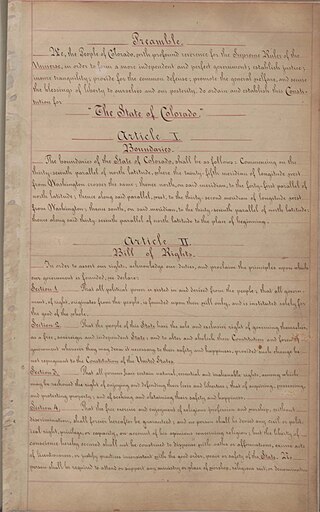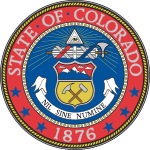
Town meeting, also known as an "open town meeting," is a form of local government in which eligible town residents can directly participate in an assembly which determines the governance of their town. Unlike representative town meeting where only elected representatives can participate in the governing assembly, any town voter may participate in an open town meeting. This form is distinct from town hall meetings held by elected officials to communicate with their constituents, which have no decision-making power.

The Colorado General Assembly is the state legislature of the State of Colorado. It is a bicameral legislature consisting of the Senate and House of Representatives that was created by the 1876 state constitution. Its statutes are codified in the Colorado Revised Statutes (C.R.S.). The session laws are published in the Session Laws of Colorado.

Proposition 58 was a California ballot proposition on the March 2, 2004 ballot. It passed with 4,535,084 (71.2%) votes in favor and 1,841,138 (28.8%) against. It was officially called the California Balanced Budget Act. It requires the state legislature to pass a balanced budget every year, which means that budgeted recurrent expenditure, including repayment of past debt, does not exceed estimated revenue. The act does not require that capital works programs be funded out of current revenues. The California Constitution has always allowed bond issues for specified capital works, above a certain value. Bond measures must be approved by a statewide ballot.
In the politics of the United States, the process of initiatives and referendums allow citizens of many U.S. states to place legislation on the ballot for a referendum or popular vote, either enacting new legislation, or voting down existing legislation. Citizens, or an organization, might start a popular initiative to gather a predetermined number of signatures to qualify the measure for the ballot. The measure is placed on the ballot for the referendum, or actual vote.
The Taxpayer Bill of Rights is a concept advocated by conservative and free market libertarian groups, primarily in the United States, as a way of limiting the growth of government. It is not a charter of rights but a provision requiring that increases in overall tax revenue be tied to inflation and population increases unless larger increases are approved by referendum.

The California special election of 2005 was held on November 8, 2005, after being called by Governor Arnold Schwarzenegger on June 13, 2005.

Colorado Referendum I was a proposed law that would have established domestic partnerships in the U.S. state of Colorado. The bill was passed by the Colorado General Assembly and was submitted to popular referendum during general elections on November 7, 2006.

Amendment 38 was a measure on the 2006 ballot in Colorado. If passed, it would have amended the Colorado Constitution. It would have extend the petition process to all levels of state government to expand citizens' ability to propose changes to state laws and local ordinances or resolutions.

Florida held various statewide elections on November 7, 2006.

The Constitution of the State of Colorado is the foundation of the laws and government of the U.S. state of Colorado. The Colorado State Constitution was drafted on March 14, 1876; approved by Colorado voters on July 1, 1876; and took effect upon the statehood of Colorado on August 1, 1876. As of 2020, the constitution has been amended at least 166 times. The Constitution of Colorado derives its authority from the sovereignty of the people. As such, the people of Colorado reserved specific powers in governing Colorado directly; in addition to providing for voting for Governor, state legislators, and judges, the people of Colorado have reserved initiative of laws and referendum of laws enacted by the legislature to themselves, provided for recall of office holders, and limit tax increases beyond set amounts without explicit voter approval, and must explicitly approve any change to the constitution, often with a 55% majority. The Colorado state constitution is one of the longest in the United States.
An earmark is a provision inserted into a discretionary spending appropriations bill that directs funds to a specific recipient while circumventing the merit-based or competitive funds allocation process. Earmarks feature in United States Congress spending policy, and they are present in public finance of many other countries as a form of political particularism.

California's state elections were held November 3, 1992. Necessary primary elections were held on March 3. Up for election were all the seats of the State Assembly, 20 seats of the State Senate, and fifteen ballot measures.

Initiative 126 or the Savings Account for Education Initiative appeared on the ballot as Amendment 59. The measure would have created a savings account in the state education fund funded by 10 percent of the monies deposited into the fund, including revenue that would otherwise be rebated under the Taxpayer Bill of Rights rules.
Buckley v. American Constitutional Law Foundation, Inc., 525 U.S. 182 (1999), was a United States Supreme Court case that dealt with the authority of states to regulate the electoral process, and the point at which state regulations of the electoral process violate the First Amendment freedoms.
A Massachusetts general election was held on November 8, 1994 in the Commonwealth of Massachusetts.

A referendum to amend the Constitution of Liberia was held on 23 August 2011. Voters chose whether to ratify four amendments regarding judge tenure, elections scheduling, presidential candidate requirements and the electoral system. The National Elections Commission of Liberia (NEC) oversaw the referendum.

Municipal elections were held in San Diego in 2016 for mayor, city attorney, city council, and ballot measures. The primary election was held on Tuesday, June 7, 2016, and the general election was held on Tuesday, November 8, 2016. Five of the nine council seats were contested. Two city council incumbents ran for reelection.
The financial referendum is a form of the referendum and an instrument of direct democracy. It always relates to parts of the public budget of a government and allows citizens to vote directly on individual budget items.
The following is a list of ballot measures, whether initiated by legislators or citizens, which have been certified to appear on various states' ballots during the 2024 United States elections as of 6 September 2024.









